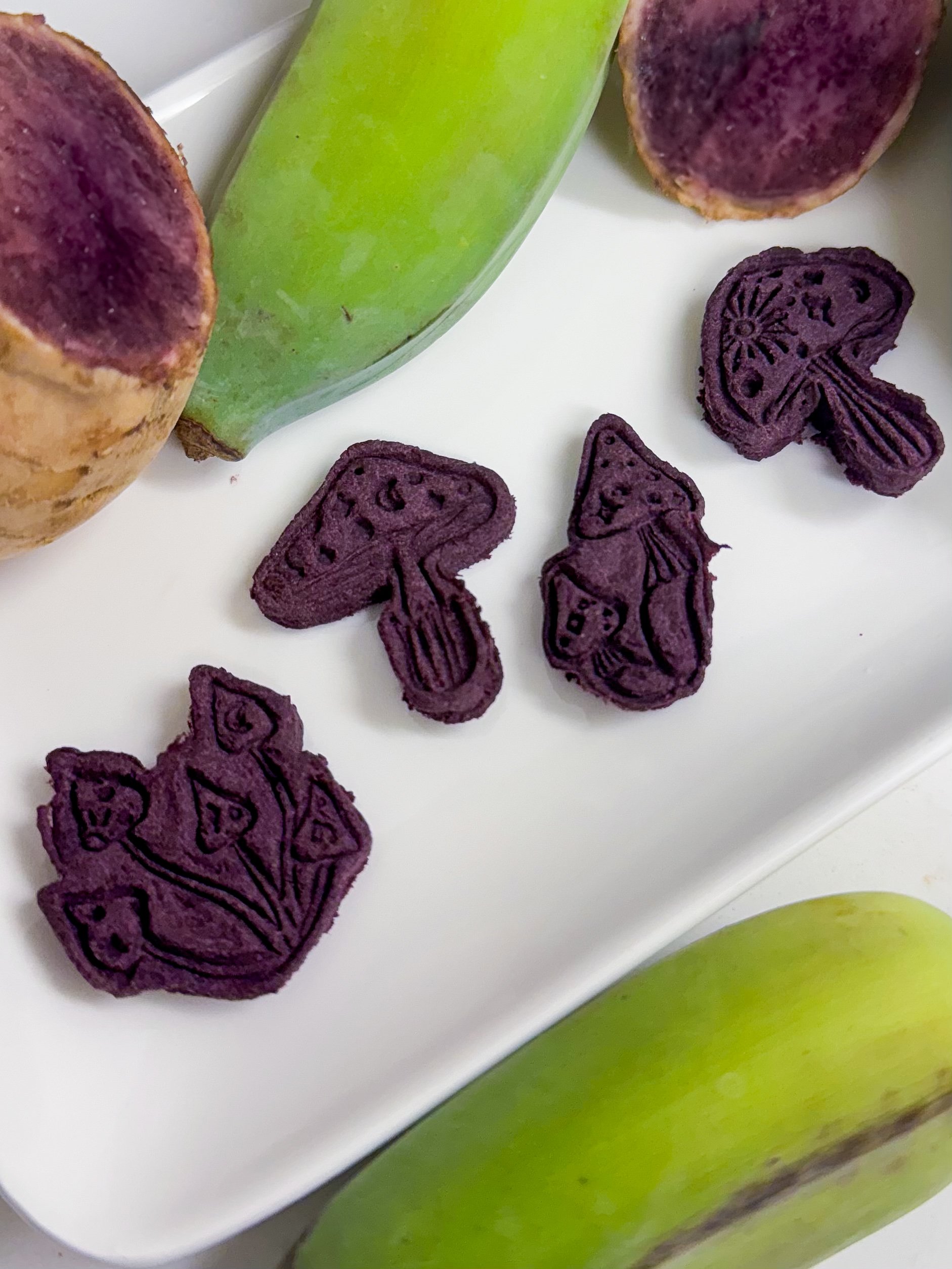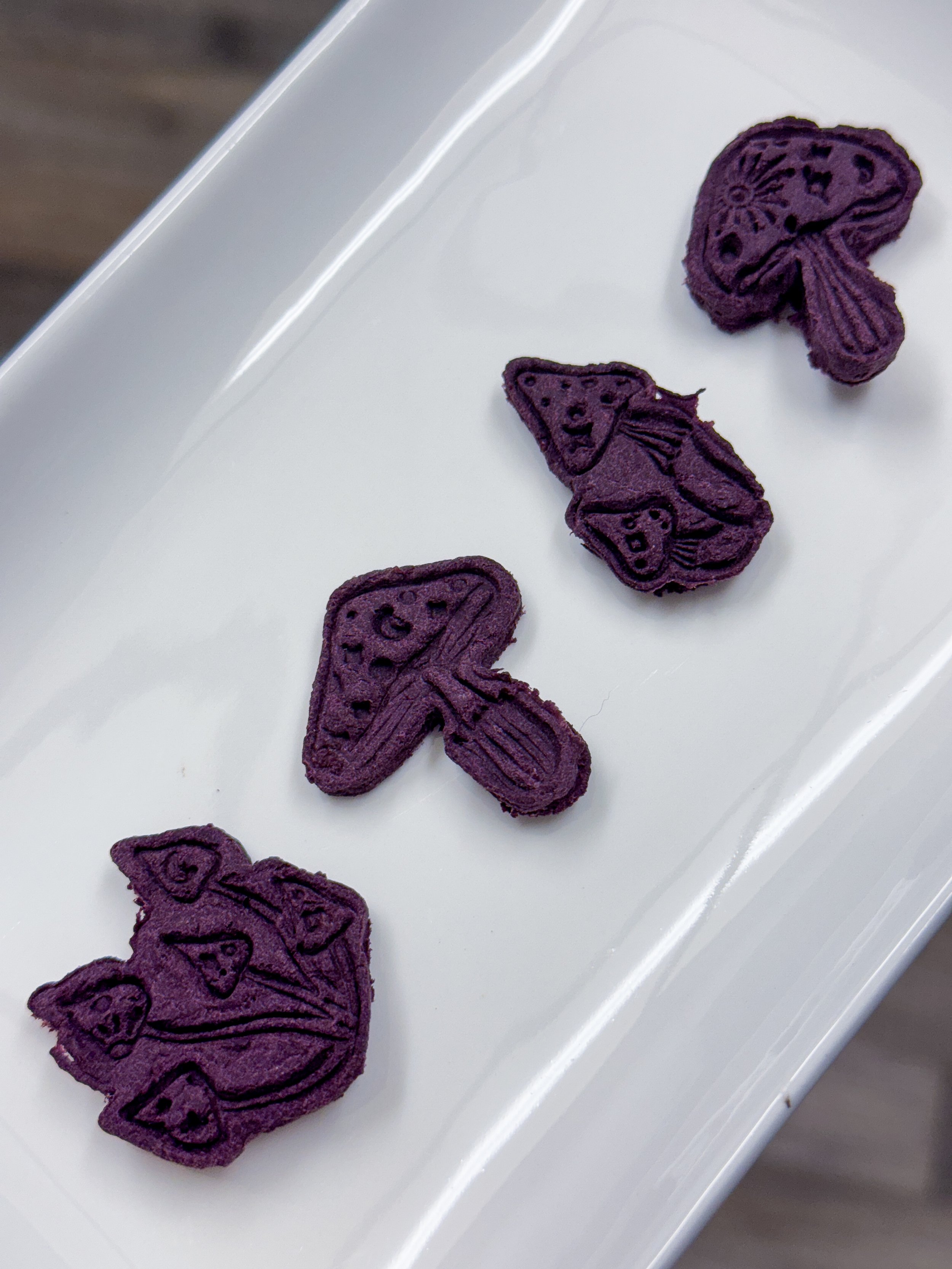From Scratch to Superfood: My Most Exciting PET Recipe Yet
After months of research, taste tests, and several batches, I’m beyond excited to finally introduce a recipe that’s been a true labor of love. I’ve poured so much time, energy, and resources into perfecting every aspect. Every single ingredient was thoughtfully and intentionally chosen—not just for its nutritional value, but for how it contributes to the overall texture, flavor, and health benefits—-because I wanted to create something that’s not only deeply nourishing but also irresistibly delicious. I’ve personally never seen anything quite like this on the market, and that makes this moment even more special. Whether you’re here for the health benefits or the flavor, I can’t wait for your pets to try these unique treats!
Here’s what sets them apart:
• High prebiotic content for optimal gut health
• Loaded with antioxidants
• Novel protein, ideal for sensitive tummies & food sensitivities
• Packed with cancer-fighting compounds
• Grain-free and easy to digest
• Includes longevity superfoods
• Human-grade, REAL ingredients only
• Gently dehydrated at 165°F for nutrient retention + food safety
Individual Ingredient Benefits
Green banana:
Benefits of Green Bananas Pets
Green bananas (unripe bananas) are often overlooked in favor of their sweeter, ripe counterparts—but these starchy fruits are actually loaded with powerful nutrients that may help fight cancer and support overall health.
1. Rich in Resistant Starch
Green bananas are one of the best natural sources of resistant starch, a type of carbohydrate that resists digestion in the small intestine and ferments in the large intestine. This fermentation process produces butyrate, a short-chain fatty acid that has been extensively studied for its role in:
• Promoting healthy gut bacteria (a strong microbiome is linked to lower cancer risk)
• Reducing inflammation in the colon
• Supporting apoptosis (programmed death of damaged or potentially cancerous cells)
• Helping maintain the integrity of the gut lining, which is crucial in preventing toxins from leaking into the bloodstream
2. Prebiotic Power
Green bananas contain prebiotic fibers (like inulin and pectin) that act as a prebiotic, feeding the good bacteria in your gut. A healthy gut micro-biome supports digestive health and plays a huge role in immune function, and an optimized immune system is better equipped to identify and eliminate abnormal cells that could turn cancerous. This is also great for pets with sensitive stomachs or post antibiotic gut imbalances.
3. Low Sugar, Low Glycemic, High Fiber
Unlike ripe bananas, green ones are low in sugar and high in fiber—making them a smarter choice for blood sugar regulation, diabetic pets, pets prone to blood sugar spikes and reducing systemic inflammation.
4. Contains Bioactive Compounds
Green bananas contain phenolic compounds and antioxidants that can help combat oxidative stress. Chronic oxidative stress damages cells and DNA, contributing to cancer development over time.
5. Rich in Fiber
• Can help with constipation or irregular stools, but should be introduced slowly to avoid loose stool or gas.
• Great for dogs prone to anal gland issues.
6. Nutrient Boost
• Provide potassium, magnesium, and vitamin B6, which are essential for nerve function, muscle health, and overall vitality.
Purple Sweet Potato:
Purple sweet potatoes aren’t just pretty — they’re powerful! If you’re looking to add a pop of color and a boost of nutrition to your pet’s bowl, purple sweet potatoes might be your new best friend.
Here’s why they’re a total superfood for dogs (and yes, even cats — in tiny amounts):
1. Antioxidant Powerhouse
• That gorgeous purple color comes from anthocyanins, a type of antioxidant also found in blueberries - great for immune support!
• Anthocyanins help fight inflammation, support brain health, and may reduce the risk of chronic disease — including cancer.
2. Great for Gut Health
• Rich in both soluble and insoluble fiber, they help support healthy digestion, regulate bowel movements, and nourish good gut bacteria.
• Helpful for dogs with anal gland issues or pets prone to constipation.
3. Immune System Support
• Purple sweet potatoes contain vitamin C, manganese, and beta-carotene, which help keep the immune system strong and protect cells from oxidative stress. Also wonderful for skin and coat health!
4. Low-Glycemic, Nutrient-Dense Carb
• Unlike white potatoes, purple sweet potatoes have a lower glycemic index, meaning they won’t spike blood sugar levels as quickly. A great option for diabetic pets or those who need clean, whole-food carbs.
5. Skin, Eye & Coat Health
• Thanks to their vitamin A (from beta-carotene) and vitamin E, they support vision, skin health, and a glossy coat.
6. Natural Anti-Inflammatory
• The antioxidants in purple sweet potatoes may help reduce chronic inflammation — great for senior pets, those with arthritis, or pets recovering from illness or surgery.
Free Range Goat:
Goat meat (often called chevon or cabrito depending on the age of the goat) is actually a fantastic, nutrient-dense protein source for both dogs and cats when sourced and served properly. Here is a breakdown of the benefits:
1. Lean, High-Quality Protein
• Goat is naturally low in fat and high in protein, making it excellent for building and maintaining lean muscle mass.
• Ideal for weight management or pets that need a clean protein source.
2. Hypoallergenic Alternative
• Goat is considered a novel protein for many pets, meaning it’s less likely to cause allergic reactions compared to common meats like chicken or beef.
• Great for pets with food sensitivities, itchy skin, or chronic ear infections linked to diet.
3. Rich in Key Nutrients
• High in iron, which supports red blood cell health and oxygen transport.
• Contains zinc (for immune health), selenium, vitamin B12, and omega-3 fatty acids — all vital for skin, coat, and organ function.
4. Easy to Digest and gentle on sensitive tummies
• Because it’s lean and clean, many pets tolerate it well, especially when switching from fattier or more processed proteins.
If your dog or cat has food sensitivities, goat might just be your new go-to.
PS - I sell Meow & Woof freeze dried raw food in goat recipe in my online store too! :D
Check out Meow —-> HERE
Check out Woof ——> HERE
Turkey tail:
Turkey Tail mushrooms are one of the most researched medicinal mushrooms out there, and they offer incredible immune-boosting and gut-supportive benefits for both cats and dogs when used properly.
As a certified pet nutrition coach, who’s passionate about holistic wellness, I’m always looking for simple, natural tools that actually work — and Turkey Tail is one I recommend again and again. Let’s dive into why . . .
What Are Turkey Tail Mushrooms?
Turkey Tail (Trametes versicolor) is a medicinal mushroom named for its colorful, feather-like appearance. You’ll often find it growing on logs in the forest — but its real magic is in what it does inside the body. It’s rich in beta-glucans, polysaccharopeptides (PSP), and polysaccharide-K (PSK) — compounds known to modulate the immune system, meaning they help the body respond more effectively to threats without overstimulation.
Top Benefits of Turkey Tail Mushrooms for Dogs & Cats:
Turkey Tail mushrooms may not look like much — just a frilly fan growing on logs in the woods — but don’t let their humble appearance fool you, they’re serious immune system powerhouses for pets. These medicinal mushrooms are packed with immune-modulating compounds that can help your pet thrive, especially when facing immune challenges, chronic inflammation, or cancer.
Turkey Tail mushrooms are one of nature’s most incredible immune allies. Whether you’re looking to support your pet through chronic illness, strengthen their defenses during allergy season, or simply give their microbiome a little love — this mushroom delivers.
These medicinal mushrooms are packed with beta-glucans and compounds like PSK and PSP — which have been studied for their ability to:
• Support the immune system
• Slow cancer growth (especially in dogs with hemangiosarcoma)
• Soothe chronic inflammation
• Act as a prebiotic to fuel healthy gut bacteria
1. Immune System Support
Turkey Tail is rich in beta-glucans, natural polysaccharides that help regulate the immune system. They don’t overstimulate; instead, they help the body respond appropriately — whether that means ramping up when there’s infection or calming down during inflammation.
Perfect for pets dealing with:
• Chronic inflammation
• Autoimmune disorders
• Recurring infections
• Seniors with weakened immunity
• General immune support during stress, illness, or seasonal changes
2. Powerful Anti-Cancer Properties
Turkey Tail has been heavily researched for its cancer-fighting properties, especially in dogs. Studies show it may:
• Slow tumor growth
• Improve quality of life
• Support immune recovery during chemo or radiation
• Extend survival time (especially in dogs with hemangiosarcoma)
Many integrative veterinarians include Turkey Tail in cancer support plans.
3. Gut Health & Microbiome Balance
Turkey Tail acts as a prebiotic, feeding the beneficial bacteria in your pet’s gut. A healthy gut = better digestion, better nutrient absorption, and even better mood (yes, pets have a gut-brain connection too!).
It’s particularly helpful for pets recovering from:
• Antibiotics
• Digestive upset
• Food sensitivities or chronic loose stool
4. Anti-Inflammatory & Antioxidant Support
Chronic inflammation is at the root of many pet health concerns — from allergies to arthritis. Turkey Tail helps regulate the inflammatory response and neutralize free radicals that contribute to cellular aging and disease.
Whether your pet’s facing allergies, recovering from antibiotics, needs immune system support, reduced inflammation or you’re needing cancer fighting support — Turkey Tail is a natural, research-backed way to boost your pets overall wellness.
I’ve used Turkey Tail with several of my dogs during recovery periods and even with my sweet girl Lily, when she was fighting heart cancer, the results have always been beyond what I could have hoped for! I have also recommended it to clients whose pets are navigating cancer, digestive issues or have allergy-prone pets. The feedback? Consistently positive. As always, quality matters. Choose clean, pet-safe products — and if you’re unsure where to start, you can head to my online store to check out the Turkey Tail that I have available. As always, if it’s in my store, it has been thoroughly vetted and you can rest assured that it is of superior grade!
Nutrition facts Per set of 4:
46.7 calories
0.48 fat
12.4 cholesterol
19mg sodium
5.5 carbs
1 grams fiber
4.4 Protein
0.7mg iron
7.8mg Calcium
130mg Potassium
Organic Turkey Tail Mushroom Extract (Trametes versicolor) 159 mg
Beta-(1,3)(1,6)-glucans 48 mg
General guideline, as with all treats:
• Start slowly and introduce gradually to avoid digestive upset
• Always monitor how your pet reacts to new foods.
• Not all mushrooms are safe or digestible for pets in their raw form — so it’s important to choose the right form.
• Turkey Tail for Dogs: small 100–200 mg/day & medium to large 200-500 mg/day
• Turkey Tail for Cats: 50–100 mg per day of turkey tail (start low — they’re more sensitive)
• These treats are NOT a substitute for cancer treatment — but a potential powerful adjunct therapy
• Avoid use in pets with mushroom allergies (rare)
• Always check with your vet before introducing a new food or supplement, especially if your pet has existing conditions such as immune-related conditions, digestive issues, cancer, diabetes, or is on a special diet, is on immunosuppressive medications or undergoing treatment.
• Like with any new protein, introduce slowly to avoid digestive upset.
Purple Sweet Potato Precautions:
• Feed in moderation — too much can cause loose stools or gas.
• Purple sweet potatoes are not ideal for pets with yeast overgrowth or on very low-carb diets (like strict raw feeders or cats with insulin resistance).
• Cats are obligate carnivores and have different digestive needs, so plant foods should be minimal and only used occasionally as a fiber boost or treat (very small amount, and not daily).


